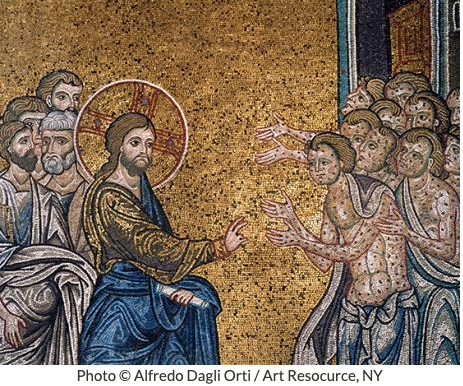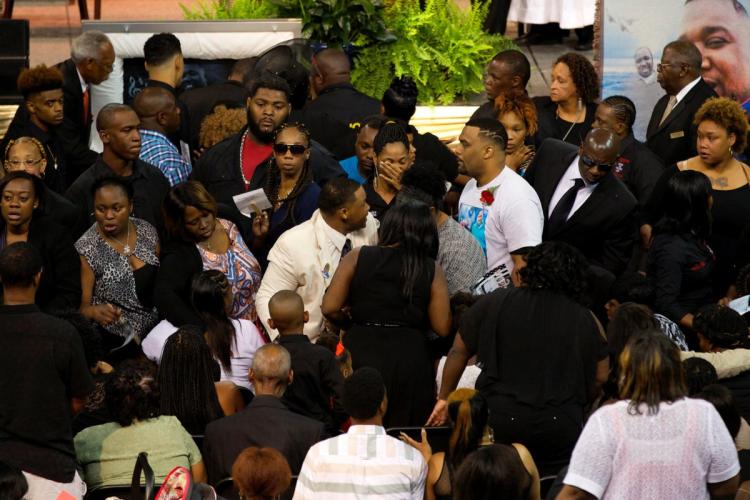This is a guest post by Dr. Kathy Lilla Cox, Research Associate at the University of San Diego. Dr. Lilla Cox is the author of Water Shaping Stone: Faith, Relationships, and Conscience Formation, an article in the journal Horizons, book reviews in the Journal for the Society of Christian Ethics, this piece in National Catholic Reporter, and a chapter of Putting God on the Map. She previously contributed to our Conscience at the Polls series here.
Leviticus 13:1-2, 44-46
Psalm 32: 1-2, 5, 11
1 Corinthians 10:31-11:1
Mark 1:40-45
A year ago the coronavirus existed on the horizon of our consciousness with zero USA COVID-19 deaths and a worldwide death toll estimated at 1,383. Worldwide deaths now surpass 2.3 million people including approximately 470,000 in the USA leaving loved ones reeling from loss and grief. Meanwhile, people continue rehabilitating from COVID-19, struggling with everything long-term illness brings. Healthcare workers, public health officials and others trying to solve for the various consequences of COVID, as well as the rest of us, are living with varying degrees of exhaustion. Collectively, we grapple with the various forms of isolation, quarantine, and separation from each other that COVID mandates, and the uncertainty wrought by its various manifestations.
Thus, while the first reading does not console, it may reverberate and resonate. In scripture, leprosy was a term used to describe a host of skin diseases. These diseases had different physical manifestations that necessitated different treatments, isolation periods, and prescriptions (rituals) before reentry into the community. We could rewrite Leviticus 13 substituting the term COVID for leprosy, charting the various manifestations of COVID like our ancestors did for leprosy. Like our ancestors, we find ourselves isolating sick members to help prevent COVID from spreading. We too require re-testing or certain markers indicating a return to health before people can exit isolation and quarantine rejoining their small communities. Yet, isolation and mourning are not the full story. The gospel directs us toward hope and the possibility of healing.
The gospel of Mark recounts a man with some type of leprosy asking Jesus to make him clean, which would restore him to the community and relationships. Jesus heals. And then instructs the man to stay quiet, go to the priest for examination, offer what is demanded by Moses for being cleaned, with the curious rationale– “that (it) will be proof for them (the priests).” The man ignores Jesus’s request, proclaiming loudly and widely his healing. The man appears more concerned with reaching a broader community about his good news than proving to the priests that he is made clean. The man seemingly knew the community needed hope, hope that things could change.
The psalm and second reading had me sitting with and revisiting events between the election (November 3, 2020) and now. Events that raise questions of accountability, how are we responsible for each other’s actions, acknowledgement of wrongdoing (sin), the relationship between a distorted Christianity and white supremacy, and what do the calls for unity and healing really mean?
Psalm 32 is a psalm of thanksgiving for forgiveness and healing. However, the Psalmist indicates that restoration to authentic, healed relationships requires acknowledging that one has sinned. Before we heal, we must name our sins, name the way we have harmed others. Without this acknowledgement, calls for unity and healing fall far short for beginning the process of restoration.
Paul goes even further beyond the need to acknowledge our sins. The Corinthians lived within a community where tensions and frayed relationships as well as different understandings of what discipleship entailed existed. Prior to today’s passage, Paul advises the Corinthians not to sin as their ancestors sinned. He reminds them and us that the exercise of Christian freedom is deeply relational. Acting in freedom, means considering how our actions affect others. Paul’s emphasis on relationality and responsibility for others is important since too often today (even for Christians) “freedom” is equated with “I get to do what I want and owe you nothing.” Paul tells us that exercising our freedom must strengthen the community, support the weakest amongst us, not seek what is for my advantage but what glorifies God and benefits others.
As we move into Lent while continuing to live with the pandemic, the reverberations of post-election events, including the attack on the Capital and a second impeachment trial, along with the fraying fabric of various relationships I think these readings invite us to ponder questions which invite us into new relationships with ourselves, each other, and God.
For me, these questions include: Where and how do we hold ourselves and others accountable? Have I/we acknowledged our sins and asked for forgiveness? What diseases, besides COVID, might require isolation from the community until healing takes place? Have I/we accurately diagnosed diseases to treat them? Have I/we proclaimed freely the good news of my healing? How can I/we build up rather than tear down our communities? Do our actions celebrate the God of life, creativity, support, forgiveness, accountability, and healing? What gives us hope?




